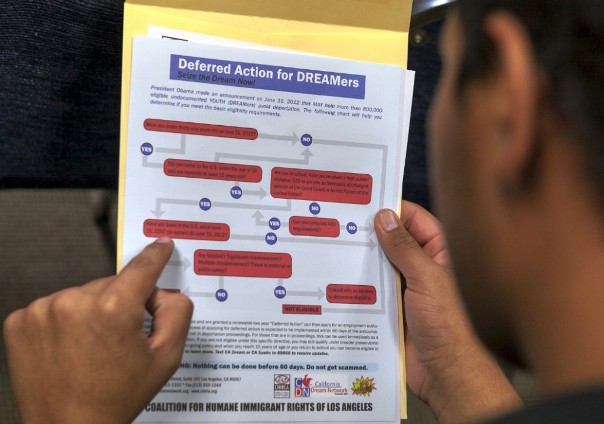|
|||||||||
|
By:
ESTHER YU-HSI LEE | |||||||||
| Posted:
Jul,31-2015 15:59:02
| |||||||||
|
In response to a court order issued by U.S. District Court Judge Andrew Hanen, federal immigration officials will beginshowing upat the residences of over 1,000 undocumented immigrants who were erroneously given employment authorization documents (EAD) and deportation relief for three years under President Barack Obama's executive action known as the Deferred Action for Childhood Arrivals (DACA) program this week.
Home visits are expected to begin in Chicago, Los Angeles, Houston, Dallas, and potentially San Francisco, an issue that some advocates fear could have adverse impacts on the immigrant community. Immigrants who do not return their cards by July 17 will have their DACA status terminated, the National Law Reviewreported.
In February, Judge Hanen issued an injunction, or a temporary block, to halt Obama's latest series of executive actions related to immigration. The executive action would have expanded deportation relief and work authorization to about five million undocumented immigrants, as well as extended current employment authorization documents (EAD) to a three-year time period, instead of the initial two years.
As many as 108,000 three-year EADs were issued to DACA recipients between Obama's November 2014 announcement and Hanen's February 2015 injunction--including about 2,000 three-year EADs issued after Hanen's ruling while federal systems were updating its database.
When the U.S. Citizenship and Immigration Services (USCIS) agency realized it had mistakenly issued the 2,000 three-year EADs, it began sending out letters to individuals explaining they had to return them because "the authorized period should have been for 2 years, not 3 years." USCIS also said that individuals who didn’t return their cards would be subjected to "adverse action."
USCIS has since indicated that at least 1,000 individuals never returned their three-year EAD cards, despite receiving two-year replacements. As a result, the agency will pay home visits to these DACA recipients.
Justice Department lawyers insist that the three-year EADs would have expired at the end of two years anyway and any documents obtained using those three-year cards would have expired at the same time. According to a district court hearing transcript from June, Justice Department lawyers told Hanen that the Texas Department of Public Safety already began taking "corrective actions" to ensure that the SAVE database, used to verify driver's licenses, has updated its system to reflect a two-year expiration date.
But invalidating the cards wasn't enough for Hanen, who insisted on taking back the three-year cards. He told the lawyers, "if it means going and knocking on their door and saying, 'Here's your two year. Give me your three-year card,' you ought to do that. I mean, how hard can that be?"
Hanen added at the time that if the issue hadn't been resolved by July 31, "then I'm going to figure out what action to take."
Advocacy groups and immigration lawyers are on edge over the home visits, noting that the presence of an immigration official could inject unnecessary fear into the immigrant community. That's because immigrants haven't always had the best relationship with immigration agents who make home visits generally to take immigrants away for potential deportation proceedings.
"I think the idea of home visits is an exceptionally poor idea of building trust in light of the future implementation of DAPA," Simon Sandoval-Moshenberg, director of immigration advocacy at Legal Aid Justice Center in Falls Church, VA, told ThinkProgress. DAPA, the acronym for the Deferred Action for Parents of Americans (DAPA) program, was part of the expanded deportation relief program under Obama's latest executive actions that covered parents of U.S. citizens and legal residents.
"You have to understand that nearly every single kid with DACA has undocumented parents. I'm sure there are some exceptions, but I haven't met any," Sandoval-Moshenberg added. "What we're talking about is immigration agents knocking on doors where undocumented parents reside. The biggest fear factor to convince people to sign up for DACA was always, 'I don't want to sign up for something if it's going to benefit me, but on the flip side hurts my parent.'" Sandoval-Moshenberg said that community agencies like Legal Aid, as well as the Department of Homeland Security agency--which includes USCIS and the U.S. Immigration and Customs Enforcement (ICE) agency --had to do a lot of trust-building to convince people to apply for the initial DACA program and promise them that "nothing bad is going to happen to your parents." "And that's still true. If an undocumented parent happens to be the one who opens the door, it's not like the USCIS agent is going to slap the cuffs on him and take him downtown," Sandoval- Moshenberg said. "But it's just really brings back a lot of those old fears. It's in a context of an agency, that not too long ago, obviously it's not USCIS, but ICE which is still part of DHS, was doing no-knock home invasions in these very same communities. That problem has really calmed down a lot in the past couple of years, but.. an immigration agent knocking on your door is still something that creates tremendous fear among the community." Still, as a preventative measure, advocates are also urging immigrants to return their three-year cards. "These are people who paid the fees, applied on time, were approved for DACA, and now, because of an error, are at risk of losing their protection from deportation," Christina Jimenez, managing director of United We Dream, said in a statement. "But our message to those who received their three-year work authorizations is, Return them as soon as possible to avoid losing your DACA and falling out of immigration status." Hanen's injunction arose from a 26-state lawsuit, led by Texas, arguing that Obama lacked the constitutional authority to put his executive actions in place. The states claimed they would face fiscal injury from the DACA program, in part because deferred action recipients would become eligible for driver's licenses and, in the lead plaintiff Texas' case, their taxpayers would have topartially subsidizethe cost of processing applications for those driver's licenses.However, aCenter for American Progress reportfound that those costs "would be more than offset by the additional tax revenues generated by the very immigrants who might apply for the licenses." | |||||||||
|
Source:
Think Progress
| |||||||||
|
||||||||||||||||||||||||||||||||||||||||||||||||||||||||||||||||||||||||||||||||||||||||||||||||||||||||||||||
|
||||||||||||||||||||||||||||||||||||||||||||||||||||||||||||||||||||||||||||||||||||||||||||||||||||||||||||||


.jpg)




